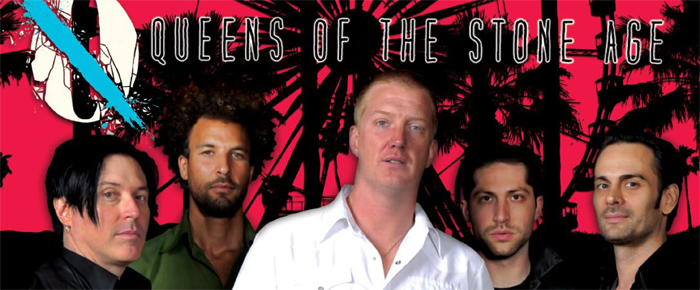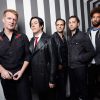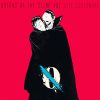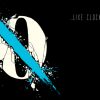
JOSH HOMME FROM KYUSS TO QOTSA, HIS DESERT ROOTS RUN DEEP
Intro by Robin Linn
Our love for desert rock here in the Coachella Valley goes back to the early nineties when the year-round population in the desert was minimal in comparison to the droves of residents that live here now. In those early days there were a handful of groundbreaking bands making sounds so completely fresh and unique from anything I had ever experienced in the large neighboring cities I had lived and performed in. LA and San Diego seemed to be full of bands enlisting a structured formula to their songs that was cumbersome and contrived. Not so in the desert. Bands like Across The River which featured a young Mario Lalli, Alfredo Hernandez and Scott Reeder, the first real desert jam band with a punk essence, Josh Homme and John Garcia founded Kyuss, Mario and cousin Larry formed Fatso Jetson and with Gary Arce, Sort of Quartet and Yawning Man. In all of these musical scenarios, there is a core of players that have helped push desert rock to the forefront of the world wide music scene. Throughout all of the changes in music over the years, Josh Homme seems to enlist a strong vision and attitude about making his own brand of original music that has served him well. These are players that march to their own drummers, and the music that continues to come out of the desert has found its way across the pond where it has grown to be so significant, bands labeling themselves “desert stoner rock” are coming out of every country in Europe.
Kyuss and then Queens of the Stone Age, working under the direction of producer Chris Goss (Master of Reality), recorded albums that still influence rock music all over the world today. When Kyuss split up in 1995, the band members all picked up and moved on, and every single member of that seminal desert rock band has gone on to develop sounds and create music that is cutting edge and completely unique. The first inception of QOTSA began in Seattle where Homme took off to make his mark with his then brand new band. That first self-titled record still is regarded as the break out record that started the whole “desert stoner rock” ball rolling in the mid-nineties. On that debut record, it was just Josh and Alfredo, with Josh playing bass, guitar and vocals and Fredo on drums. Longing for the desert they were born in, they returned from Seattle to their Palm Springs playground and recorded the debut Queens of The Stone Age record with producer Chris Goss’ at Monkey Studios in Palm Springs (Now Robbie Waldman’s Unit A Recording and Arts Studio).
Alfredo Hernandez remembers, “You can hear in my performance on that record how comfortable and at ease I was…I was in my own back yard in Palm Springs where I grew up, as was Josh, and we were still young and life and music was full of possibilities. To this day, I feel inspired when I listen to that record.”
Since those early days, the world wide fan base for desert rock is gaining steam. Kyuss vocalist, John Garcia and drummer Brant Bjork moved forward with Vista Chino, Scott Reeder has had great success with several projects including Sun and Sail Club with members of Fu Man Chu, Alfredo Hernandez has a new European (V2) record deal with members of Slo Burn in their new band, Brave Black Sea. Contributing QOTSA bassist Nick Oliveri has found his own voice with Mondo Generator and tours as bassist for Moistboyz.
But no desert band has achieved greater success than Queens of the Stone Age. Josh Homme was always at the epicenter of our original underground music scene since its inception. He has proved he has a clear vision about his own musical concepts and pushed forward with some of the world’s most significant hard rock performers with QOTSA. Their sounds are psychedelic, heavy yet musical and they turn out some of the most beloved stoner rock the world has ever known. They are hometown heroes to those of us that reside in the desert Homme came from. Their success and their participation in the two week-long annual Coachella Music and Arts Festival event has brought them home to us once again.
The current lineup of QOTSA features players that can bring Homme’s creative visions to life with perfection. Troy Van Leeuwen (who blew us all away with A Perfect Cirlce) is a brilliant guitarist and multi-instrumentalist that has added dimension to the QOTSA sound of today. Along with bassist Michael Shumman, drummer Jon Theodore and keyboardist Dean Fertita, they have risen to the top of the world music market place, bringing them to this year’s Grammy’s both as nominees and performers.
Their most recent record Like Clockwork, released in June of 2013, moved 91,000 units in the first week, charted at #1 on the Billboard 200 and went on to go platinum within weeks of its release. The record features brilliant songwriting shaped by the raw desert rock of the early years, refining their style into a sound so unique they have been coined one of the most influential rock bands of our day. They have raised the bar for popular music by creating sounds like no one else on earth. Homme managed to find commercial success without ever giving up a single ounce of self-respect or originality. You CAN stay true to your own creative vision and you CAN find audiences sophisticated enough to get it. You DON’T have to sell out to make it. You have to stick to your guns, work your ass off, and believe in the music you are making. I know I speak for many of us die-hard desert music fans when I say we value Josh Homme for pushing forward his creative vision without compromise and carrying the torch for desert rock. For the next two Saturday nights, festies will be treated to some of the most significant hard rock of our time right here in the Coachella Valley offered up by one of the most ground-breaking rock bands of our time…..Queens of the Stone Age.
Interview with Josh Homme
by Tracy Dietlin
CVW: How does it feel to come back home and play Coachella?
Josh Homme: Well I think I’ve played Coachella more than anyone but with different bands…Queens, Them Crooked Vultures, Desert Sessions. I guess from growing up in the desert I always feel like something’s going to happen to make it fail like a great restaurant will open but doesn’t make it through summer… but the fact that Coachella has become this huge festival and that it’s been able to stay at the Polo Grounds, which I think is where it should be, is really wonderful. I’m really proud of that. Promoters from all over the country come to check out Coachella. It’s become such an artistic venue.
CVW: I’m sure nobody expected it to be so successful when it first started.
JH: They knew they were going to lose money at the beginning but they drew this artistic line and just did it. And Goldenvoice has been able to maintain their ethos and artistic vision at a time where there is less and less promoters like that in the world…so good for them.
CVW: I’m sure way back in the generator party days you and Mario and all the guys never thought there would end up being an actual rock genre “desert stoner rock” that would come from that.
JH: Ya… You’re just living in the moment. And for me it all comes back to Boomer (Mario Lalli) and there was only one generator and it was his. And he was such a benevolent, sweet, encouraging person. I first played Mario’s house when I was 13. And it was great because someone actually liked my music. He was such a driving force suggesting that you just had to be as original as possible. That it was a necessity. He really instilled that in me. I really think that he’s the guy who’s really responsible for fostering it and watering it and putting it out in the sun and creating the whole scene. He’s the nicest guy ever and a real family man. He’s influenced me so much lyrically that sometimes I feel like I’m ripping him off. He’s the one thing that you always want to be and that’s “unheckleable”. You can walk up to him and say ‘I don’t like your music” but you can never say “your music is fake”.
CVW: What was it like back then being on the edge of something exciting and new compared to now with all of the success you’ve had? Do you still get the same adrenaline rush?
JH: Honestly on the last 4 tours we’ve been on it’s been a series of firsts and milestones and moments. It’s like one long journey and I never thought when we were playing parties that I would be here. It wasn’t for money…it wasn’t for fame…you just played for music. The desert is the hardest crowd I’ve ever played. I got a thick skin growing up playing here.
CVW: It’s always baffled me how so many desert bands go to Europe and have great success over there but come home and can barely get to play a gig in their hometown. QOTSA is one of the few bands that have been able to have huge commercial success here in the US. Why do you think that is? What do you think sets you apart?
JH: I don’t know. I do know that my Dad Mike Homme is a hard working guy that would get up at 3am and go to work. And he instilled a lot of that in me. And I hope it has something to do with just working. I love what I get to do and I don’t ever take it for granted and I feel like it’s going to be taken away at any minute (chuckling) and so I try to enjoy the moment as much as possible. I still find myself surprised after doing this for 25 years at the things that happen.
CVW: Do you prefer touring here in the US or in Europe?
JH: I really enjoy being in Holland and Belgium and France from a country perspective. They’re efficient and laid back and have great common sense and the crowds are like that. By the same token we just went to Australia and it was crazy down there. You have to learn to adjust to every county’s personalities. It’s easier to play in the States because I have 2 kids and I wife that I really love and want to be around all the time so it’s hard to be away too long.
CVW: So do you and Brody tour together or separately?
JH: We try for only one of us to be out at a time. It’s a very delicate balance of schedules. We were all touring together in Australia. We just feel like we’re better when we’re all together and that’s all that really matters. But it can be tricky how to make it all happen. Ideally we’re on different album cycles but sometimes it overlaps. Nothing else means anything. I’ve never really been into stuff. Those kids are funny. I’ve never related to anyone as much as my 2 year old. They’re fun (laughing). I don’t know if that means I’m still juvenile or what.
CVW: Do you still have a home in the desert?
JH: Ya…we go back and forth. We spend a lot of time up in Joshua Tree too. It’s like that’s the upstairs of the desert and this is downstairs. We have so many friends up there that we don’t need to have our own place there.
CVW: There’s a whole new generation of musicians playing in the desert that weren’t here back in the generator days and many of them look up to you like rock royalty and idolize you. How does that make you feel when you come back and you’re hanging out at The Hood or Schmidy’s and they come up to you?
JH: Everyone is pretty nice. I don’t want to act like it’s no big deal and trivialize it but I just feel like ‘hi, I’m Josh from Palm Desert’. I mean I’ve gotten to do all kinds of special stuff that’s been amazing. That doesn’t make me better it just makes me grateful that any of it ever occurred in the first place. And again everyone is always really cool. It’s not like they stroll up and say anything rude to me. That’s only the people that have known me for 30 years (laughing). I expect that. It’s part of the desert dialogue.
CVW: So I know you have other projects too. What’s going on with EODM and Them Crooked Vultures?
JH: We’re trying to do an Eagles record now. It’s just making it all work. I did Vultures when nothing was going on and same with Eagles and they have all just kind of rotated but now there’s a bit of an overlap and that’s really tough. I hate it when things aren’t moving along because of me and I don’t want to be the reason they aren’t. I’m a little responsible with that right now with Eagles… but there are only so many hours in the day. I really don’t have a favorite of the three. I enjoy doing all of them so I’m struggling because I really want to do it… but I also have to do things like go to bed and spend time with the kids and eat a sandwich.
CVW: It is a lot to balance.
JH: I’m certainly not complaining. It’s an uptown kind of problem to have as they would say, but it can be kind of confusing trying to figure out how to keep all the plate spinning and it’s an interesting rubiks cube to figure out. And you can’t high five yourself for getting just one side of the rubiks cube right.
CVW: What would you say has been the highlight of your career?
JH: Things like playing with Billy Gibbons (ZZ Top) was one of my dreams as a kid and just realizing that he’s a wonderful person and getting to spend time with him. He’s an amazing guy, a special guy and he’s not making a big deal about himself. And I find myself just wondering who can I share this stuff with and I just shut up and enjoy it. Playing with John Paul Jones has been great. I knew we were friends when we got into an argument and we were able to move on. You never really know somebody until things go wrong and you see how you come out of it.
CVW: Who were your influences growing up and who are they now?
JH: Then it was like the Cramps, Black Flag, Exploited, Misfits…that is what I consumed and I didn’t want to hear anything else. And music my parents listened to like the Doors and Jackson Browne. And now I listen to a lot of stuff. Right now there’s a guy JD McPherson who’s an incredible singer and songwriter. I love the Arctic Monkeys.
CVW: What advice would you give musicians starting out?
JH: Make music you like and are proud of. You may do that forever and nobody ever hear you but you know you’ve created something you stand behind.















































